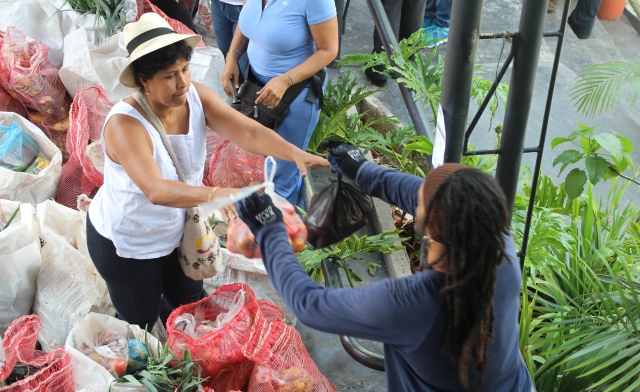Foreign Correspondent: How the US Media Distort News from Venezuela

Most of the reporters are echoing the lines of the Trump Administration — as if anything Trump says is credible.
By Reese Erlich – March 22, 2019 – 48Hills
Whenever officials in Washington, D.C. set out to overthrow a foreign government, mainstream US media outlets are there to give a helping hand. All pretense of fairness and balance disappear in favor of outrageous distortion. For the most recent example, let’s look at Venezuela.
Both high-level Republicans and Democrats have decided it’s time for Venezuela, with the world’s largest oil reserves, to rejoin the US sphere of influence. Hawks may call for direct military intervention while doves seek punishing sanctions, but all agree that the elected government of President Nicolas Maduro has got to go.
Mainstream media took a particularly rightward turn in January after Juan Guaidó anointed himself as Venezuela’s president, with the blessings from the administration of President Donald Trump. Guaidó is president of the opposition-dominated National Assembly and had never even run for president. A January opinion poll showed he was unknown to 81 percent of the people. He represented an unstable alliance of opposition parties. As I’ve written before, lack of legality didn’t stop the United States and its allies from declaring Guaidó president and pretending he ran an actual government.
As if responding to a bat signal in the skies above Gotham City, the mainstream media rushed to back the Trump team’s policies. The administration, which has proven incompetent and dangerous on other issues, was suddenly a reliable source of information on Venezuela. Statements from the administration and Venezuelan opposition leaders were uncritically reproduced, no matter how untethered to reality. Allow me to offer some examples.
In February, Guaidó announced plans to deliver international aid to starving Venezuelans by mobilizing massive demonstrations at the Venezuela-Colombia border, hoping a significant number of military officers would defect. The plan was obviously flawed because military leaders continued to back Maduro. Sure enough, the aid convoy didn’t get through, and military officers didn’t defect.
Many media outlets reported that Maduro’s security forces burned an aid truck as it attempted to enter Venezuela. In reality, aerial and other photos reported in real time by the leftist website Venezuela Analysis indicated that the fire was started by an anti-government protester. Weeks later, The New York Times got around to reporting that Maduro’s forces didn’t start the fire.
Another example of bias: The Times and other US media focused exclusively on the US aid, ignoring that donated by Russia and Cuba without incident.
In mid-March, Venezuela’s electric grid went out nationwide, causing huge economic dislocation and dozens of deaths. President Maduro said a US cyber attack caused the shutdown. CBS News reported this claim, but gave it no credence, dutifully saying US officials “dismissed the Venezuelan government’s accusation as absurd and an attempt to divert attention from its own chronic failings.”
The Maduro government has yet to provide proof of its assertion. But as a commentary in Forbes showed, the United States could well have launched such an attack. Remember, the US and Israel initially denied creating the Stuxnet virus that disabled Iranian nuclear facilities.
Why distortions?
I’ve been a foreign correspondent for forty years and have reported from Venezuela since 1994. I’ve met many journalists in the mainstream media, from The New York Times to CNN and NPR. None see themselves as government mouthpieces, and in private, many will criticize Trump. So why the distorted coverage?
Mainstream reporters and editors take their cues from Washington, D.C. Since bipartisan leaders see Venezuela as beyond the pale, so do the media. They see Maduro as “hard left,” similar to the leaders of Cuba or the old USSR. As a result, they accept US government assertions pretty much without question. They often make no effort to get Maduro’s side, or even to find academics or former government officials who can balance a story with a pro-Maduro views.
In one particularly egregious article, The New York Times Washington, D.C., bureau recently quoted Secretary of State Mike Pompeo at length about how Russia and Cuba are “propping up Venezuela,” an absurd claim given Cuba’s own economic problems and Russia’s distance. The article contained one perfunctory paragraph with the Venezuelan government viewpoint.
Vicious attacks
Reporters know there are few consequences for misreporting about Maduro and his allies, but that the roof caves in if they report negatively about the opposition.
In 2017, I filed a series of stories on Venezuela for Canadian Broadcasting Corporation’s daily website. While reporting government-sponsored brutality, I also noted that the opposition engaged in violent tactics against the police. I wrote that the momentum was shifting away from the anti-government demonstrators. I came under vicious attack online in a clear effort to discredit not only the articles but me as a reporter.
To their credit, CBC editors defended my reporting. A few weeks later, the opposition demonstrations petered out as the country prepared to vote for a Constituent Assembly.
A positive exception
Of course, the mainstream media is not monolithic. Knight-Ridder, now owned by McClatchy, accurately reported that weapons of mass destruction didn’t exist in Iraq during the run up to the 2003 war.
McClatchy reporters have now uncovered covert US arms shipments from Miami to Venezuela. Their article explored possible links between the charter airline carrying the weapons and the CIA’s program in the 2000s of kidnapping and taking civilians to black sites. I hope other reporters follow up—but am not holding my breath.
The government of Venezuela certainly deserves a lot of criticism. Inflation is skyrocketing. Venezuelans face shortages of food and medicine. Unemployment is increasing as work places shut down because of the crisis. But that doesn’t justify US efforts to overthrow Maduro and install an opposition leader.
————–
Reese Erlich has been reporting abroad for 40 years. His column Foreign Correspondent appears twice monthly.